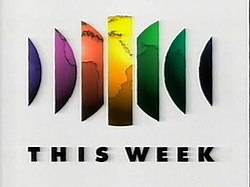This article needs additional citations for verification .(February 2022) |
| This Week | |
|---|---|
 Title card in 1992 | |
| Genre | Current Affairs |
| Opening theme | Intermezzo from Karelia Suite |
| Composer | Jean Sibelius |
| Country of origin | United Kingdom |
| Original language | English |
| Production | |
| Production companies |
|
| Original release | |
| Network | ITV |
| Release | 6 January 1956 – 20 July 1978 |
| Release | 11 September 1986 – 17 December 1992 |
This Week is a British weekly current affairs television programme that was first produced for ITV in January 1956 by Associated-Rediffusion (later Thames Television), running until 1978, when it was replaced by TV Eye. [1] In 1986, the earlier name was revived and This Week continued until Thames lost its franchise at the end of 1992.
Contents
In September 1958, This Week filmed George Harrison Marks and Pamela Green at their photography studio in Gerrard Street. David Kentick directed and Nick Barker interviewed Marks and Green. They were filmed working with a nude model, who was strategically covered by a very long wig. The film sequence ended with a montage of their photographs, mostly of nudes. However, the night it was to be broadcast Pope Pius XII died and the programme was cut, and the interview never shown. In 1964, This Week returned to their studio. This time round they showed a clip of the infamous striptease comedy film The Window Dresser.
However, its most influential episode[ according to whom? ] was an exposé on the National Front in 1974, which led to the party's members firing their Chairman John Tyndall and National Activities Organiser Martin Webster two weeks later as a result of the revelations on the show from former NF Chairman John O'Brien of their neo-Nazi paramilitary pasts and continued links.
In 1976 the episode Death in the West believed to contain the first recorded admission from a tobacco company representative that smoking causes health problems resulted in an injunction from Philip Morris International.
The most controversial edition was "Death on the Rock", a 1988 documentary which questioned the official account of the Gibraltar shootings.
During its run, the programme's presenters included Ludovic Kennedy, James Cameron, Jonathan Dimbleby, Robert Kee, Dan Farson, Jeremy Thorpe (who became leader of the Liberal Party), Desmond Wilcox, Bryan Magee, Peter Taylor (noted for his coverage of Northern Ireland), Denis Tuohy, John Morgan and Yvonne Roberts.
The programme used the Intermezzo from Sibelius's Karelia Suite as a signature tune. [2]